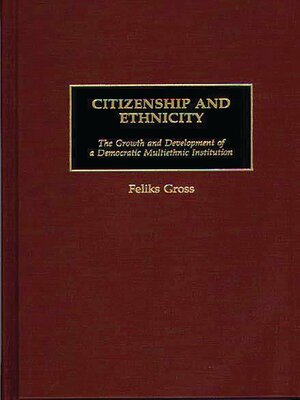Citizenship and Ethnicity
ebook ∣ The Growth and Development of a Democratic Multiethnic Institution · Controversies in Science
By Feliks Gross

Sign up to save your library
With an OverDrive account, you can save your favorite libraries for at-a-glance information about availability. Find out more about OverDrive accounts.
Find this title in Libby, the library reading app by OverDrive.



Search for a digital library with this title
Title found at these libraries:
| Library Name | Distance |
|---|---|
| Loading... |
Today, all industrialized states are multinational. However, as Political Sociologist Feliks Gross points out, there remains considerable debate and experimentation on how to organize a multiethnic, democratic, and humane state. Gross examines various types of multiethnic states as well as their early origins and prospects for success. In the past, minorities were usually formed as a consequence of conquest or migration; minorities tended to have an inferior status, subordinated to the ruling, dominant ethnic class.
While Athens provides an early example of a state formed by alliance and association, the Romans advanced this concept when they extended to subjected peoples the status by means of citizenship. After the fall of Rome, citizenship continued in Italian and other continental cities. In England, subjectship associated with individual freedom had native roots. The American and French Revolutions revived and created the modern definition of citizenship. Along with Rome, however, only the United States provides an example of a successful multiethnic state of continental dimensions.
While Athens provides an early example of a state formed by alliance and association, the Romans advanced this concept when they extended to subjected peoples the status by means of citizenship. After the fall of Rome, citizenship continued in Italian and other continental cities. In England, subjectship associated with individual freedom had native roots. The American and French Revolutions revived and created the modern definition of citizenship. Along with Rome, however, only the United States provides an example of a successful multiethnic state of continental dimensions.







